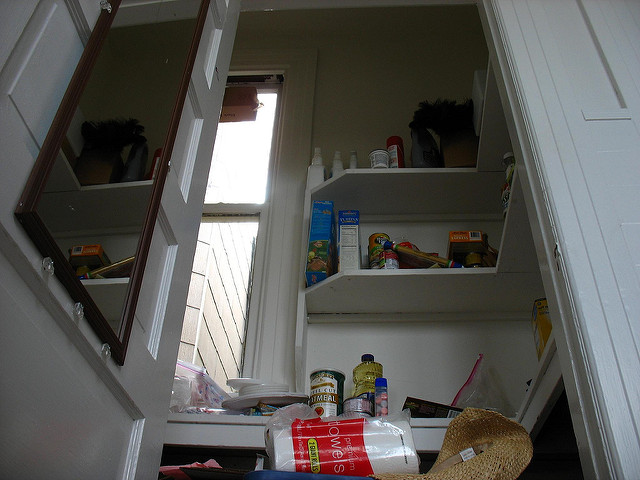Hunger is a constant challenge here in the Tar Heel State. While it may not dominate every news cycle, one in 7 North Carolina families struggles to put food on the table on a daily basis. In fact, food insecurity is so omnipresent here that North Carolina has earned the heartbreaking distinction of being the 10th hungriest state in the nation.
Unfortunately, the Agriculture and Nutrition Act of 2018, better known as the House Republican Farm Bill, currently under consideration has the potential to make things much worse. It would impose unnecessary, damaging and overly restrictive work requirements on people who need SNAP, formerly known as food stamps, which helps families afford groceries when they’re going through hard times.
The premise behind the bill’s new restrictions – that somehow people who use SNAP are lazy – is offensive and wrong. More than half of SNAP households have at least one working-age, non-disabled adult who holds a job while receiving SNAP. Many of those who don’t are ill, attending school, trying to escape an abusive relationship, or have caregiving needs or responsibilities that prevent them from being in – or staying in – the workforce.
Even many of those who do hold jobs would be one job loss, one downgrade in hours, or one illness away from losing their SNAP benefits – and going hungry – if this bill becomes law.
Imposing these work requirements is especially callous because there is no reason to expect Congress to make a sufficient investment in childcare, job training, transportation, housing and other supports that are essential to helping people enter or re-enter the workforce. This Congress has long been focused on giving tax breaks to the richest one percent, not making life better for the rest of us.
MomsRising and our partners recognize the House Republican Farm Bill as a direct attack on women and on mothers, who manage most family caregiving and, in many cases, are also the sole or key breadwinners for their families. And we are convinced that this plan would lead to millions of moms all across the country losing access to SNAP, and then being forced to make impossible decisions between paying their rent or purchasing medication – and feeding their kids.
Common sense says that taking food assistance away from struggling households will exacerbate their hardship and increase and intensify hunger in America. Work requirements won’t strengthen families or boost our economy – they will only leave hungry children and families to get hungrier.
SNAP is a lifesaver for families in need, and it saves funds in the long run by providing vital nutrition assistance to moms, kids and families. Families across North Carolina have reached out, sharing their own stories of why SNAP is so essential for their families and our communities. Here are just a few of their stories:
Mary from Hendersonville: I was forced into early retirement by a national nursing cooperative a few years back. I am an RN and had worked for them for eight years. I was one year and two months away from retirement. I had had emergency surgery …. My husband and I were struggling to keep a roof over our heads and transportation and then he lost sight in both his eyes. It took months to finally get the VA involved, despite his Vietnam era service. My mobility became more and more an issue, and I finally got a diagnosis of spinal stenosis. I was able briefly to draw disability due to a pre-existing heart condition … We applied for SNAP and it was a Godsend. We could have more than egg sandwiches and peanut butter. Since then, my husband has been able to receive a VA pension, so we aren’t struggling as much, although our income remains right at the poverty level, but we now only get $15 a month from SNAP. Thank goodness for food pantries!
Mallory from Fayetteville: SNAP helped my family when there was a massive lay off at my job. Approximately 200 employees were laid off without notice, including myself. The SNAP program aided in meals for myself and my son during the months I was unemployed.
Darlene from Asheboro: In 2015 I became deathly ill. I was out of work for eight months. Family and friends were doing all that they could do to help me survive, provide medical and keep me from losing everything I owned, including my house. I did lose my car but that was better than losing my life. I asked our government for assistance. With zero income for eight months, the only local, state or federal program in NC that I qualified for was $194 in SNAP benefits for six months. It was a huge help, but at the same time it was quite sad this did not cover food costs. I have celiac disease so I have to eat gluten free, plus I have 86 food allergies. All my food has to be home cooked and there are very few processed foods that I have found that I am not allergic to. It’s such a small amount, but it would have been more horrible not to have this tiny government benefit for someone who has worked all her life.
Lona from Raleigh: I am a recent widow who doesn’t get Social Security and whose husband didn’t have a life insurance policy, etc. when he passed, and whose grandparents/other family members aren’t able to help. [Not having SNAP] would mean going without daily medication I have to take, and both my daughter and I having to go without medical care of any kind. It would mean we would likely starve as well. Both of us have multiple food allergies/sensitivities. Before we had food stamps, we were having to try to find ways of getting to food pantries/getting referrals for food pantries, and even then most of what we got we couldn’t eat. I went without often so my daughter could eat.
Ann from Southern Pines: I became seriously ill, ended up in the hospital and took over a year to be able to manage for myself. I ended up having to declare bankruptcy. I lost my job. I am on Social Security but it is not enough to pay my rent and the utilities and my medication. I rely on [SNAP] and I would starve without it. I am very afraid of what will happen.
Elizabeth from Winston Salem: “I receive SNAP benefits. It’s not much, but it helps me to put good healthy food on the table. I am on a fixed income as well as my mother, who I live with because she has cancer. SNAP has been so helpful. I have only been receiving it for a few months but with those $16 can go far for me. With coupons and cash back rewards I can get food for about 2 weeks. It is life or death for us. The healthy food is a must for us to try and fight my mother’s cancer and my own disability. If the budget is cut for SNAP we will be the first to go. I’m disabled and she’s a senior citizen.
Mary, Mallory, Darlene, Lona, Ann and Elizabeth are not unusual. In Fiscal Year 2016, SNAP served more than 44.2 million people in more than 21 million households in this country, on average, each month. Half of children in our country will benefit from SNAP at some point in their childhoods. Women make up 63 percent of SNAP’s adult recipients.
It’s because of those women, and so many others like them, that MomsRising is organizing in North Carolina and across the country to stop this devastating farm bill. It would lead to millions of people losing access to the program, forcing them to make impossible decisions between paying their rent and feeding their kids.
Work requirements won’t strengthen families or boost our economy – they will only leave children and families to get hungrier.
So we have to ask ourselves: Do we want more children to lose access to nutritious food? Do we want more seniors to go hungry? Do we want more hunger in America? Do we want Congress to pass the Republican Farm Bill?
If the answer is ‘no,’ then we have to act right now. Pick up the phone and call your representative in Congress, and then ask your friends and family members to do the same. If you lawmaker is already supportive of protecting SNAP, now is the time to tell them that they have to do more. Be louder. Make some noise. North Carolina families are counting on them.
Beth Messersmith is the NC Senior Campaign Director for MomsRising.org


[…] The premise behind the bill’s new restrictions – that somehow people who use SNAP are lazy – is offensive and wrong. More than half of SNAP households have at least one working-age, non-disabled adult who holds a job while receiving SNAP. Many of those who don’t are ill, attending school, trying to escape an abusive relationship, or have caregiving needs or responsibilities that prevent them from being in – or staying in – the workforce. Continue reading […]